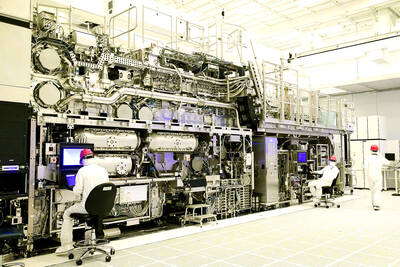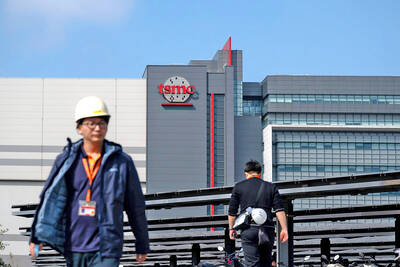Apple Inc has teams investigating a push into personal robotics, a field with the potential to become one of the company’s ever-shifting “next big things,” people familiar with the situation said.
Engineers at Apple have been exploring a mobile robot that can follow users around their homes, said the people, who asked not to be identified because the skunk-works project is private.
The iPhone maker also has developed an advanced table-top home device that uses robotics to move a display around, they said.

Photo: Reuters
Although the effort is still in the early stages — and it is unclear if the products will ultimately be released — Apple is under growing pressure to find new sources of revenue beyond its iPhones, and the digital content and services it sells.
The company scrapped an electric vehicle (EV) project in February and a push into mixed-reality goggles is expected to take years to become a major moneymaker.
With robotics, the Cupertino, California-based company could gain a bigger foothold in consumers’ homes and capitalize on advances in artificial intelligence (AI).
However, it is not yet clear what approach it might take.
Although the robotic smart display is much further along than the mobile bot, it has been added and removed from the company’s product road map over the years, the people said.
Before the EV project was canceled, Apple told its top executives that the company’s future revolved around three areas: automotive, the home and mixed reality, but now the car is not happening and Apple has already released its first mixed-reality product, the Vision Pro headset.
So the focus has shifted to other future opportunities, including how Apple can better compete in the smart home market.
The table-top robotics project is happening within Apple’s hardware engineering division and its AI and machine-learning group. The idea is to have the display mimic the head movements — such as nodding — of a person on a FaceTime session. It would also have features to precisely lock on to a single person among a crowd during a video call.
However, the company has been concerned about whether consumers would be willing to pay top dollar for such a device.
There have also been technical challenges related to balancing the weight of a robotic motor on a small stand.
The primary obstacle has been disagreement among Apple executives over whether to move forward with the product at all, the people said.
A spokeswoman of Apple declined to comment.
If the work advances, Apple would not be the first tech giant to develop a home robot.
Amazon.com Inc introduced a model called Astro in 2021 that cost US$1,600, but it was slow to offer the device in major quantities and it remains a niche product.
Amazon debuted a more business-focused version of the rolling bot last year designed to work as a security guard, while other companies have also presented the idea of humanoid robots that mimic the size and movements of people.

ASML Holding NV’s new advanced chip machines have a daunting price tag, said Taiwan Semiconductor Manufacturing Co (TSMC, 台積電), one of the Dutch company’s biggest clients. “The cost is very high,” TSMC senior vice president Kevin Zhang (張曉強) said at a technology symposium in Amsterdam on Tuesday, referring to ASML’s latest system known as high-NA extreme ultraviolet (EUV). “I like the high-NA EUV’s capability, but I don’t like the sticker price,” Zhang said. ASML’s new chip machine can imprint semiconductors with lines that are just 8 nanometers thick — 1.7 times smaller than the previous generation. The machines cost 350 million euros (US$378 million)

Apple Inc has closed in on an agreement with OpenAI to use the start-up’s technology on the iPhone, part of a broader push to bring artificial intelligence (AI) features to its devices, people familiar with the matter said. The two sides have been finalizing terms for a pact to use ChatGPT features in Apple’s iOS 18, the next iPhone operating system, said the people, who asked not to be identified because the situation is private. Apple also has held talks with Alphabet Inc’s Google about licensing its Gemini chatbot. Those discussions have not led to an agreement, but are ongoing. An OpenAI

INSATIABLE: Almost all AI innovators are working with the chipmaker to address the rapidly growing AI-related demand for energy-efficient computing power, the CEO said Taiwan Semiconductor Manufacturing Co (TSMC, 台積電) yesterday reported about 60 percent annual growth in revenue for last month, benefiting from rapidly growing demand for artificial intelligence (AI) and high-performance computing applications. Revenue last month expanded to NT$236.02 billion (US$7.28 billion), compared with NT$147.9 billion in April last year, the second-highest level in company history, TSMC said in a statement. On a monthly basis, revenue surged 20.9 percent, from NT$195.21 billion in March. As AI-related applications continue to show strong growth, TSMC expects revenue to expand about 27.6 percent year-on-year during the current quarter to between US$19.6 billion and US$20.4 billion. That would

‘FULL SUPPORT’: Kumamoto Governor Takashi Kimura said he hopes more companies would settle in the prefecture to create an area similar to Taiwan’s Hsinchu Science Park The newly elected governor of Japan’s Kumamoto Prefecture said he is ready to ensure wide-ranging support to woo Taiwan Semiconductor Manufacturing Co (TSMC, 台積電) to build its third Japanese chip factory there. Concerns of groundwater shortages when TSMC’s two plants begin operations in the prefecture’s Kikuyo have spurred discussions about the possibility of tapping unused dam water, Kumamoto Governor Takashi Kimura said in an interview on Saturday. While Kimura said talks about a third plant have yet to occur, Bloomberg had reported TSMC is already considering its third Japanese fab — also in Kumamoto — which would make more advanced chips. “We are